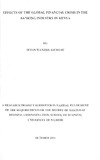| dc.description.abstract | The objective of this study was to determine the effect of the global financial crisis on
commercial banks in Kenya. The current study expected to establish how Kenyan banks
prepared, dealt and saw themselves through the crisis which climaxed in 2008/09 financial
year. This study therefore adds to new knowledge on how commercial banks in emerging
economies of Africa such as Kenya dealt with the crisis.
The study employed a cross sectional survey design. The target population of this study was
all the 43 commercial banks in Kenya which included both locally owned and those that are
subsidiaries of foreign multinationals (CBK, 2011). Due to the size of population, the
researcher carried out a census hence each bank had a subject who was the source of
information required. In this study a semi-structured questionnaire and an interview were
used to gather primary data from senior managers of the targeted commercial banks
responsible for risk management. Data collected was both qualitative and quantitative in
nature. Qualitative data was collected through semi structured interviews with the selected
respondents. This data was manipulated through thematic summary analysis that depicted
what the main theme and direction of responses was. Quantitative data was collected through
questionnaires. This data was manipulated through descriptive statistics such as means,
percentages and frequencies. This data was presented in tables and graphs.
Findings indicate that although the crisis started out in 2008, Kenya experienced a lagged
effect and started to face significant consequences later on. The measures deployed to
withstand the crisis were oriented towards a combined strategy of increasing liquidity and
investing in stocks and fixed income securities. Interestingly, even during the crisis, Kenyan
banks diversified both their product offering and regional reach in terms of branch network.
Further, the banks seemed not to have been affected by the crunch in their operations since
vi
their recruitment, expansion and profitability improved. Results further indicate that the
Kenyan commercial banking sector resisted quite successfully to the effects of the Global
Financial crisis. While Kenya’s banking system withstood the crisis, the Nairobi Stock
Exchange was adversely affected and foreign direct investment and remittances seemed to
have slumped.
The following recommendations are made. In order to cushion financial systems from crisis,
it is important to ensure that financial sectors of Africa are regulated effectively to spurt their
growth and prevent them from collapse instigated by phenomena such as the global financial
crisis. The Kenyan sector was spared the negative effects of the global financial crisis due to
the recent deep reforms that have been implemented in the sector. In order to strengthen the
financial sector regulation, governments should establish financial sector reforms that
enhance competition, while enforcing mechanisms that minimize exposures to risky foreign
currency borrowing. Capital requirements for banks should also be revamped, since the size
of a bank was seen as factor to minimize risk of being affected by offshore forces. Banks also
should ensure that they practice good corporate governance and follow sound prudential
guidelines to ensure longevity of operations and safeguard of shareholder resources.
Customer satisfaction and confidence is also an important factor in stability and growth of a
financial system. Ensuring that customers have faith in a financial institution gives the
institution a lifeline even in terms of chaos. Lastly, financial systems in emerging economies
should learn a lesson against over-reliance on investments and capital from developed
economies. This over-reliance makes these institutions over dependent and can be the death
knell in times of crisis. | en |

